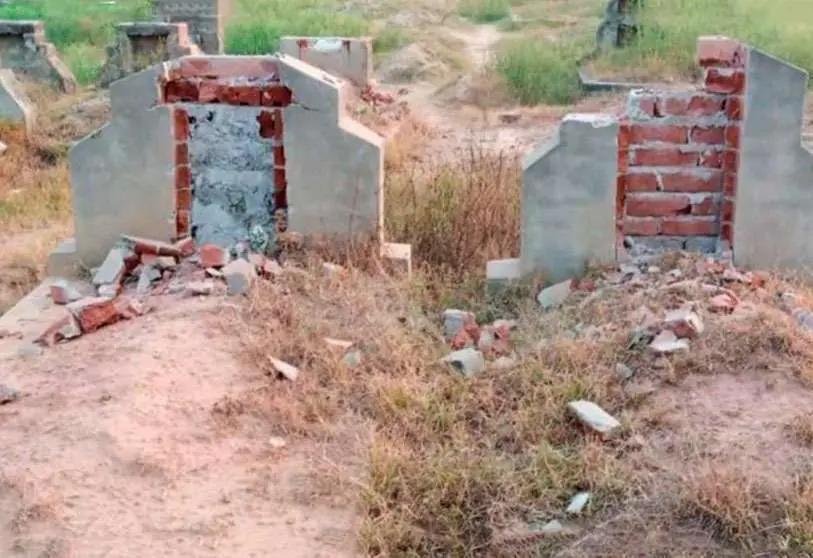Persecution of Muslim Ahmadis in Pakistan and Bangladesh

Viewed from thousands of miles away from Pakistan, the horror is even worse. Living here, where the rights of religious minorities are respected much more than they used to be, we wonder why there are others who, when they open their eyes at birth, see an environment where religion is used to make a difference, to the point of destroying the lives and sacred places of these minorities. Can you kill because you are different?
One kills for religion, for money and for power, but how frightening it is when one loses respect for the dead as well! The desecration of an Ahmadi cemetery in Lahore is an example of how conscience has died in Pakistan.
Religious fanatics - supposed "saviors" of the Muslim commonwealth - desecrate graves without even considering whether this is permitted in Islam. What do they get out of being disrespectful to the dead, who were buried without having found peace in the sanctuary of their own country? Is it not enough that these fanatical mul'lahs (uncompromising, medieval-minded clergy) do not allow the members of the Ahmadiyya Muslim Community to live in peace, so that they now destroy their eternal resting places as well?
The culprits are not arrested for these repulsive acts. Where are the law enforcement agencies and what about the cemetery guards? No matter what faith we profess, we ask ourselves what did the relatives of the people whose graves were desecrated in the most obscene manner feel? It is not difficult to understand the pain of hundreds of persecuted non-Muslims and Muslim minorities living in Pakistan. Not even the respected Chief Justice of Pakistan, the custodian of human rights, has bothered to take any action against the mistreatment of living - and now dead - minorities. There is no better opportunity for an action 'suo motu' (unilateral decision without request of the parties).
Discouraged by the law and order situation and the pervasiveness of religious fundamentalism in Pakistan, many Ahmadi Muslims have been forced to migrate to other countries in the hope of being treated on an equal footing with others in society.
An Ahmadi now living in Toronto shared his views on the incident, stating: "I am not at all surprised to hear that intolerance has penetrated so deeply into the roots of Pakistani society. How can militants and fundamentalists be expected to respect people who have left this world forever when they feel no pain for the people who are still alive? My family had to flee Pakistan in the early 1990s because we were literally harassed by radical clerics and their supporters. We received letters threatening us with death and even rape of our daughters if we did not accept the "one true" form of Islam. According to them, sexually assaulting an Ahmadi Muslim woman was not considered a crime.
"Fundamentalists believe that we use excuses like the one I just mentioned to seek asylum in foreign countries. This is not the case at all. No one wants to leave their country and everything they own, to start from scratch. But most of us have no choice," he said.
The persecution of the Ahmadis in Pakistan does not take into account social class or age. Adults and children are mistreated because of their different religious beliefs. Workplaces, playgrounds and schools are used as platforms to spread hatred against them. Educational institutions top the sinister list of those who seek to indoctrinate young minds, filling them with hatred towards anyone who does not conform to their religious standards.
Many Ahmadi Muslim students have been expelled from colleges and universities for no reason, while others are wronged with degrading and hurtful words. It is no less commendable that, when the whole world is full of hatred against Muslims (because of terrorist attacks), there is a group of Ahmadi Muslim students who are organizing meetings and symposia at the colleges and universities to try to defuse this situation, highlighting the virtues and compassionate character of the Holy Prophet Muhammad (God's peace and blessings be upon him). In our experience, the Christian, Muslim or agnostic audience that listens to the account of the life and human qualities of the Holy Prophet Muhammad (peace and blessings of God be upon him), shows positive feelings towards the religion he founded, totally equidistant from the behaviour of these "mul'lahs" who consider themselves custodians of the legacy of the Holy Prophet of Islam. Those who attend these symposia help to reduce the communication gap between the different communities, finding common ground that allows us to build an inclusive society.
Societies that grow in religious intolerance and hostility perish sooner rather than later. It is time for us to wake up and safeguard the rights of other religious beliefs, whatever they may be. It is time for us to shake hands and challenge the fundamentalist elements that are taking advantage of our silence. It is time to recognise the sacrifices of these minorities and to treat them with the respect they really deserve because their graves now call out to us for answers.

